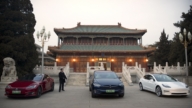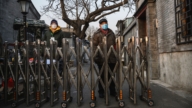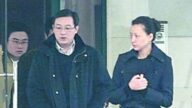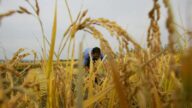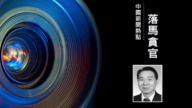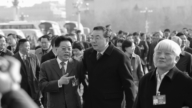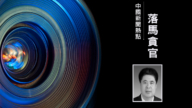【新唐人2012年12月18日讯】习近平一向被视为是一个韬光养晦,低调谨慎的官员,这也是他在中共内部派系斗争激烈的情况下,还能在十八大接棒的重要筹码。不过他上台后的初次南巡,却让外界看出了背后的谋划,他究竟是不是改革者?他的改革又能走多远?
习近平在上台之后,连打了几名贪官,之后迅速前往广东视察经济改革发展状况。习近平这次南巡被外界视为“不一般”,一是由于刻意低调,二是由于明显效仿邓小平。习近平去深圳看望母亲时,还特意去向邓小平铜像献花。
台湾副研究员陈华升15号撰文分析,习近平的一连串政治动作有几层意义。其中首要的是,“标举邓小平路线”,用来回应未来可能来自胡锦涛或江泽民的政治压力和挑战。同时也向海内外展示,尽管江系人士占了政治局常委大半席位,但他也不会在政治路线上受制于上海帮江系势力。
不过美国哥伦比亚大学政治学博士王军涛认为,习近平要完全摆脱江派控制,进行改革还是很困难。
王军涛“ 中国在5年内不会有什么太大的变化可能。如果要是有变局,只有在发生危机和突发事件,引发朝局动荡的时候,习近平他们通过政变的方式来控制局势,把江泽民原来安排的格局给它边缘化。然后另搞一个格局,这样才可以有机会去解决问题。”
习近平在过去的政治生涯,都小心翼翼的隐藏自己的观点,但上台后不久开始大谈改革、谈人民、谈腐败和谈复兴。这种变化被外界视为﹕他开始培植势力圈——“习派”,来对抗“太子党”、“团派”、和“江派”。
时事评论员刘淇昆:“ 有可能出现‘习派’。中共官场的传统,是不是跟对人了,这个很重要。那么现在习近平既然大权在握,那么有人投靠他,有人要跟他,这些都是中共官场的潜规则了。”
在民主国家,人们因为不同的政治理念而组成不同政党,但中共内部的派系向来不是这样。研究中国问题的自由撰稿人戴维科恩(David Cohen)之前在网路杂志《外交者》(The Diplomat)发表分析文章说,中共一党独大,其中派系也跟思想无关,主要看的是“靠山”。
刘淇昆:“党内出现不同的派别,是因为有不同的利益集团。无论是哪一派,他们都不是真正的宪政民主派,他们在维护中共一党独裁的统治方面,他们是一致的。所以今后中国的政治体制改革,寄托于他们当中的任何一派,都是靠不住的。”
1992年是中共的艰难时刻,经历了89年“六四”学运的中国人对中共极为失望,当时邓小平压住党内保守派的意见,到南方巡视,用刺激经济的方式又将中共的统治维持了几年。但是邓小平拒绝进行政治改革的恶果发展到今天,使得习近平想再次利用经济改革作为“强心针”也困难重重。
刘淇昆:“现在继续发展经济遇到巨大的障碍,就因为中共不搞政治改革。但是习近平在政治改革方面,他不会有任何作为。他仿效邓小平,那就是说,在经济方面改革开放,在政治方面坚持一党独裁。六四大屠杀不是邓小平制造的吗?不必对习近平在政治改革方面抱什么希望,希望越高,会失望越大的。”
习近平在南下视察的时候刻意低调,以区别以往的高官。同时,被视为下届总理人选的李克强在下基层的时候,也以方便面充饥。西方媒体认为,习、李两人效仿西方领导人的亲民和朴实,努力扭转形象。但不能忘记,温家宝同样以改革派和亲民的形象著称,但在任内并没有推动真正的改革。因此对于习、李两人,任何过早或过于乐观的结论都是不成熟的。
采访/常春 编辑/尚燕 后制/萧宇
Interpretation of Xi Jinping’s Southern Tour
Before taking office, Xi Jinping, had long been viewed as
a low profile official in the Chinese Communist Party (CCP).
This feature helped him to take over the
top power during CCP’s fierce infighting.
However, a deeper meaning behind his first
southern inspection tour, has been interpreted.
Is Xi Jinping a person who will launch political reform
in China, and if yes, how far will his reform go?
Xi Jinping has axed several corrupt officials
since he took the CCP’s top seat.
Later, Xi went to Guangdong
to inspect local economic reform.
Xi’s southern tour has been widely viewed
as “unusual", as it was intentionally low-key.
It was also seen as an emulation of Deng Xiaoping.
Reportedly, Xi specifically presented a bouquet
to a bronze statue of Deng Xiaoping, when visiting his mother in Shenzhen.
On November 15, Chen Huasheng, a research
associate at the National Policy Foundation in Taiwan, commented in an article.
He interpreted that Xi Jinping’s round
of political actions has many layers of meaning.
The foremost is that Xi “advocates Deng Xiaoping’s line"
to respond potential political pressures and challenges from Hu Jintao or Jiang Zemin.
Further, Xi demonstrates to the world that although
Jiang’s close allies have taken over half of the seats
on CCP Politburo Standing Committee, he will not
submit to Jiang’s forces for taking a political route.
Dr Wang Juntao, political science expert from Columbia
University, says that it is still very hard for Xi Jinping
to completely shake off control from Jiang’s forces.
It is also hard for him to implement reform.
Dr. Wang Juntao: “China won’t see any
major change in the next five years, I think.
Political change may only occur in the event
of a crisis outbreak, or an emergency event.
Then in order to control the situation, Xi Jinping
and his team may resort to a coup.
Xi will marginalize Jiang’s pre-set arrangements
and initiate his own, in order to solve the problem."
Over his past political career, Xi Jinping
has carefully concealed his point of view.
Yet, shortly after taking office, Xi openly talked about
reform, the people, corruption and about nation revival.
Xi’s change has been widely considered that he is fostering
his own forces, Xi’s faction, to confront “the Princelings”,
“the Communist Youth League faction”, and Jiang’s forces.
Critic Liu Qikun: “The ‘Xi faction’ may appear.
In CCP officialdom, it’s important to take
the right stand. Now Xi Jinping is in power.
Someone could seek shelter under him or follow him,
and these are hidden rules in the CCP’s officialdom.”
In a democratic country, people form different political
parties based on different political ideologies.
The case for the CCP’s factions is different, however.
David Cohen comments on this point
in his article published on thediplomat.com.
He said that, “Factions in Chinese politics
have little connection with ideology.
Rather, they are primarily patron-client networks.”
Liu Qikun: “The CCP’s different interest
groups gave birth to different factions.
None of them is real pro-constitutional democracy.
They all safeguard CCP one-party dictatorship.
So it’s unreliable to pin one’s hope on any one of them."
The CCP regime underwent difficulties in 1992.
The regime’s bloody crackdown on the
student pro-democracy movement of 1989 had smashed Chinese people’s trust in it.
In 1992, Deng Xiaoping made a southern inspection tour.
By means of economic stimulation,
Deng sustained the CCP’s rule.
China has so far witnessed the aftermath
of Deng’s refusal to launch political reform.
And Xi Jinping tried to once again take economic reform
as a booster for CCP’s ruling, which will prove difficult.
Liu Qikun: “The CCP now faces huge
obstacles in driving China’s economy.
This is just because it hasn’t implemented political reform.
I don’t expect Xi Jinping to be more active on political reform.
His emulation of Deng Xiaoping has indicated that he will
make economic reforms, but uphold the CCP dictatorship.
Wasn’t it Deng Xiaoping who created
the “June 4 Tiananmen massacre” in 1989?
Don’t pin any hope on Xi Jinping for political reform.
The bigger the expectations, the bigger the disappointment.”
Xi Jinping intentionally kept a low profile in his southern tour,
which differentiated himself from other top CCP officials.
Meanwhile, the CCP’s premier-to-be Li Keqiang also reportedly
ate instant noodles during his grassroots inspection tour.
Western media reviewed that both Xi and Li
emulated Western leaders to set up a new leadership image of being “close to the people."
Wen Jiabao was also known as a CCP reformist figure,
but was unable to truly advance reform during his tenure.
Therefore, any early or overly optimistic conclusion
on Xi and Li is premature, according to the news report.


